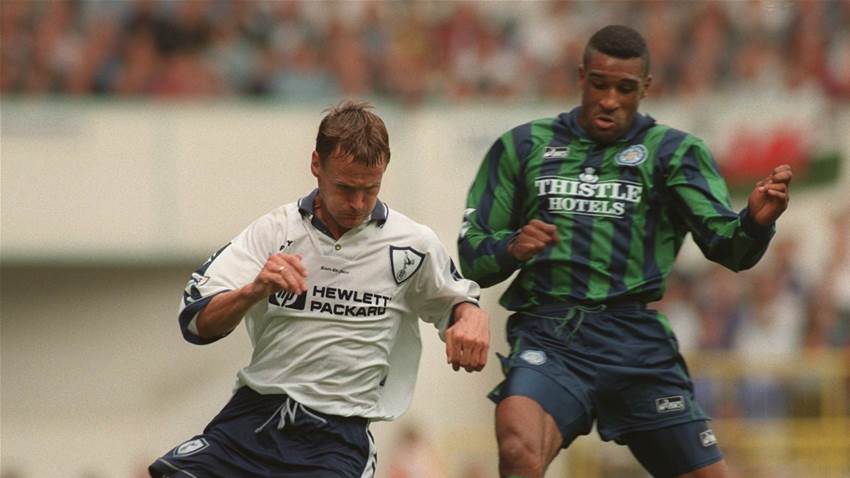What does a sports broadcaster show when there’s no sport?
That’s the question that has befallen Optus Director of Sport Richard Bayliss and his team in recent week, as Optus Sport scrambled to meet the challenges thrown up by the COVID-19 crisis gripping the globe.
One by one, a carefully collated line-up of competitions that Optus held in its stable were forced to bow in the face of the inevitable and suspend their operations.
The broadcaster’s newest addition, the J-League, was suspended on February 25, while the Premier League and FA WSL were forced into hibernation on March 13.
March 13 was also the date that UEFA announced that the Champions League and Europa League were to be suspended and international tournaments Euro 2020 and the 2020 Copa America, the latter of which was set to feature a guest appearance from the Socceroos, were postponed to 2021.
For a platform that had built itself around the broadcasting of and reaction to live sport, a landscape completely bereft of it– something that would have been unthinkable as little as six-months ago – presented an entirely new challenge.
Suspending subscription fees until May 30 and working remotely – Optus moved to ensure that staff were able to work from home in the weeks leading up to football’s sudden halt – new content was needed.
And the solution?
Everything old is new again.
“We’ve gone deeper into the archives than we ever have before,” Bayliss told FTBL.
“Obviously, when you are so focused on live football – and your whole content and editorial strategy is built around live football – you don’t get to go as deep into the archives as you would sometimes like.
“We’ve spent so much time on it now that we’ve unearthed so much archive material that we’ve had access to but maybe didn’t have the time to unearth.
“There’s the classic breakfast football every morning at 7 am from the Premier League, and European nights every evening at 7 pm eastern.
“We do a classic Champions League match and then we do mini-classics as well – turning classic matches into minis. We have a feature game of the day among a stack of matches to choose from.
6 goals 😍 2 red cards 🤬 1 kung fu kick 👟
— Optus Sport (@OptusSport) April 6, 2020
European Nights is back tonight with another classic from 2018/19 🇪🇺
Re-live it all over again from 7PM AEST 📲 https://t.co/z8zOLy2DOi#OptusSport #UCL pic.twitter.com/s4fWbux4q4
“There’s an eye-watering amount on there.
“We’ve sort of turned now into more of an archive channel or an archive companion rather than a live football companion, but that’s a sign of the times.
“We’re doing a few other things such as starting a nightly isolation trivia show on Tuesday night, which we’ll do live weeknights at 9 pm eastern with Mark Schwarzer, John Aloisi, Michael Bridges and myself. We’re cooking up a few other social ideas as well.”
And as for how back into the archive Bayliss and his team can go?
“I’d love… I was about to say I’d love to go back to show the '75 final, Leeds and Bayern Munich, but then again [Leeds] was robbed so I don’t want to necessarily bring that up,” Whites-fan Bayliss laughed.
“We’re working with our content partners, broadcast rights partners to try and unearth as much as possible.
“The longer this goes on and the greater the appetite there is to go further into the archives we’ll be pushing for as much as we can.
“With the Euros, obviously with Euro 2020 being pushed back we’ve looked to unearth some classic matches from that tournament, in 60 years of the Euros there are some brilliant games to choose from.
“We’re going back 30 years with some of the games we have access to, so people can keep an eye out for those in the next couple of weeks.”
Launched in 2016 when it secured Premier League rights, Optus has, despite some stumbles along the way, quickly established itself as a fixture in Australian football.
The broadcaster is at the vanguard of a new sporting rights paradigm, in which non-traditional, online-based broadcasters are challenging existing, television-based outlets.
Indeed, it’s now become a common trend, both in football and for other sports, for Optus’ name to be immediately thrown forward as a potential new partner when the subject of Australian television-rights arises.
But with COVID-19 throwing global sport into chaos, any plans for growth have been forced to take a backseat to consolidation.
“I think with what’s happening at the moment, with the impacts of COVID-19, it just changes the game completely with broadcast rights to anything,” Bayliss explained.
“I think [COVID-19] will completely overhaul the way broadcasting is not only sold but also the way that it’s produced and shown to the public.
“It’s really difficult to comment on any potential leagues or broadcast rights because rights holders around the world are kind of asking for money back on what they’ve already acquired, let alone going down the path of new football and new sport.
“Who knows? We’d love to go further into football, absolutely, but also, we’d like to move into other sports at some time.
“It’s just really difficult to see what happens given we don’t know the time frame of this particular scenario at the moment.”
Of course, for Australian football fans, the elephant in the room surrounding any talk of an expansion of Optus’ offerings is the potential that the A-League could possibly land at the broadcaster.
The Sydney Morning Herald has reported that the FFA has quietly begun to scope out potential landing spots for the A-League should the COVID-19 crisis provide a means for Fox Sports to end its $57 million-per-year deal with the competition and fans across social media have made no secret of their hopes that the competition would soon be migrating.
Bayliss, however, wouldn’t be drawn on the possibility of the A-League landing at the telco.
“I guess the bottom line at the moment is that the A-League is under contract with another broadcaster for three years and, as such, it’s not our property,” he said.
“We’re just dealing with this current issue at the moment with COVID-19 and what that means for our current rights.
“As a football person myself, and my team, we all love the game and love sport. Sure, we’d love to acquire more sport moving forward but, to be honest, it’s probably so far down the priority list at the moment given where everything else is at the moment in the broadcast realm.
“I can’t see anything happening on that front soon.”
Nonetheless, while the A-League might not be coming to an Optus screen near you in the near future, there has been some toe-dipping into the domestic landscape by the broadcaster.
Recent months have seen the launch of specials such as “Where It Began” and “Football Belongs,” shining a spotlight on the origins of some of Australia’s most celebrated footballers and the traditional communities and clubs that built Australian football following WW2.
The first episode of Football Belongs, featuring traditional Melbourne powers Preston Lions, was released on March 11, with a follow-up episode on the Turkish community arriving on March 25.
"We've always been taught to be proud of who we are... We're definitely patriotic. We're definitely fanatical." 🇹🇷❤️
— Optus Sport (@OptusSport) March 25, 2020
Football Belongs returns with Episode 2, and the Turkish community ⚽#FootballBelongs #OptusSport pic.twitter.com/J0Uf9rTqk9
“It’s been great,” Bayliss said on the series reception.
“We’ve been cooking up those stories for a little while and once we released the trailer, it was really heart-warming to see the positive response to those stories being told.
“I guess the effect of the coronavirus shutdown and the move away from live sport has changed our publishing strategy a little bit with that. We’re actually now publishing one feature every two weeks and we’re going to split the series in half, with the second half being released next year.
“The documentary is also now being pushed back to next year. Just to better reflect and give us a better opportunity to finish it off. We can’t go out and finish the shoots or even do the final interviews and final edits are harder to do now given the situation with working from home.
“We thought we’d take a slightly more measured approach and build-up to Euro 2021 by publishing the majority of the series just before the tournament next year.
“One of the main reasons we created Football Belongs was just to engage and connect with communities that we haven’t done so with before.
“Take Italy for example, they weren’t in the last world cup. Italian supporters generally have not had a great or compelling reason to connect with Optus Sport yet but they will when it comes to the Euros and this was a great opportunity to go out on the ground and actually connect with them.
“Meet with those communities, talk to them, tell them what we’re about and tell their stories .”
Related Articles

Fowler comes up short as PSG beat Man City 1-0 in Perth

Aussie Gorry a no-show as Leicester crush West Ham 5-2













